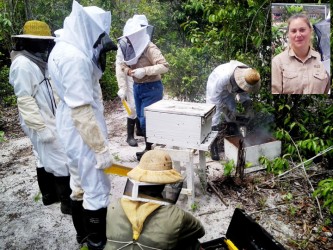Guyana’s beekeeping industry could benefit from access to various forms of technical support from facilities in the United States following discussions here between local industry officials and a Louisiana-based beekeeper who recently completed a two-week stay here providing various forms of technical support for beekeepers.
Louisiana-based Amy Weeks, who left Guyana on Wednesday following a two-week stint under the Partners of the Americas Farmer to Farmer Programme told Stabroek Business prior to her departure that arising out of her interaction with local beekeepers she would help the local industry secure access to pest and disease-testing facilities in the United States, specifically at the United States Department of Agriculture and the University of Georgia to enable crucial disease and pest testing for local bees.

President of the Guyana Apiculture Society Linden Stewart, who has been in discussions with Ms. Weeks, told Stabroek Business that the local industry’s ability to secure access to testing that will confirm the widespread belief that the local apiculture industry is disease and pest-free, could represent a crucial step in the industry’s quest to produce high-quality honey that would be competitive on a highly lucrative international market.
Weeks, who was expected to take the samples back to the United States for testing earlier this week told Stabroek Business that the results of the tests were likely to be available in “two to three months.” She disclosed that in addition to the disease and pest-testing exercise, she had agreed to provide support for the Inter-American Institute for Co-operation on Agriculture (IICA) in the compilation of a manual for distribution to local beekeepers.
During her stay, Ms. Weeks, whose current visit is a follow-up assignment to one undertaken earlier this year, provided training for local beekeepers in the areas of hive management, hive and frame construction, hive splitting, queen rearing, trapping wild swarms and honey extraction.
Weeks’ Beeline Apiary operates more than forty hives in Louisiana and markets honey and other bee products at local markets. Additionally, Beeline Apiary produces queen honeybees and nucleus colonies (nucs) which are small honeybee colonies created from, larger colonies. She currently serves as President of the Hill Country Beekeepers Association and a Board Member of the Louisiana State Beekeepers Association.
While beekeeping has been practised in Guyana since the 1930’s the industry has remained retarded by what local beekeepers say has been a combination of official neglect and a widespread fear of bees among many Guyanese, accentuated with the media hype associated with the appearance of Africanized ‘killer bees’ here during the 1970’s. Stewart has told Stabroek Business in the past that he believes that the demonizing of Africanized bees has had the effect of causing the country to overlook its potential to build a strong honey industry in Guyana on account of the fact that there are prolific producers of honey. While the Guyana Livestock and Dairy Association (GLDA) plays a role in managing official interventions in the local apiculture industry, local beekeepers have told Stabroek Business that they are unclear about the nature of the relationship between the GLDS and the local apiculture society.
Stewart, who was elected head of the local Apiculture Society earlier this year insists that with proper organization and technical support local beekeepers have the capacity to meet local market demand including what he says is the current industry need of around 4,000 gallons for use in the manufacture of local malt beverages. That honey is being imported into Guyana while, in the absence of a marketing structure, sales of local honey are consigned largely to mostly concessions by local supermarkets keen to do their bit to promote locally produced food products. Even here, weaknesses in packaging and labeling mean that most locally produced honey never appears on supermarket shelves and is confined to what is commonly known as ‘flat foot’ sales on city streets packaged in discarded rum bottles.
Much of the sluggishness of the local honey industry is probably due to what Weeks told Stabroek News was “a knowledge gap” that may have resulted from an absence of sustained interest in bees and their potential. However, she told this newspaper that she believed that the evidence of interest in the sector which she had seen during her two visits here amounted to “a good starting point” for taking the sector forward. She said that apart from providing specialized education for local beekeepers, the introduction of apiculture on the schools curriculum (as part of the Agriculture Science curriculum) could help to create a positive change in attitudes to bees in general and beekeeping in particular. Weeks said that training and sensitization programmes should also embrace sections of the emergency services, specifically firefighters, since there could be cases of having to deal with disturbed bees in answering emergency calls.
Efforts to develop a thriving apiculture industry in Guyana have also been undermined by the high costs associated with successful hive-management and the acquisition of protective equipment though Weeks said that once acquired, equipment and material can last for a long time.




